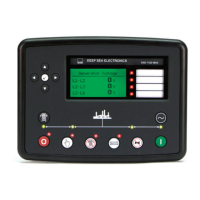Alarm action Used to select what happens when a Mains Decoupling trip is detected :
Electrical Trip – The generator load switch is opened and the set is
allowed to perform a cooling run before being stopped.
Auxiliary mains fail – Opens the mains load switch and allows the
generator to continue providing power to the load.
R.O.C.O.F.
IEEE 37.2 - 81 Frequency relay
: ROCOF protection is disabled
: ROCOF protection is enabled when the generator is in parallel with the
mains supply.
R.O.C.O.F. detection senses sudden, fast changes in the frequency of the
waveform. During the failure of the mains supply when in parallel with the
generator, the frequency will change faster than is usual by either the on
load generator, or by the mains supply.
Vector Shift : Vector Shift protection is disabled
: Vector Shift protection is enabled when the generator is in parallel with
the mains supply.
Vector Shift detection measures the length of each cycle of the voltage
wave. When the mains fails in parallel with the generator, the sudden
change in load creates a change in the length of the cycle length.
Mains under voltage
IEEE 37.2 - 27 under voltage relay
Mains over voltage
IEEE 37.2 - 59 Frequency relay
Mains under frequency
IEEE 37.2 - 81 Frequency relay
Mains over frequency
IEEE 37.2 - 81 Frequency relay
Used to enable and set the levels at which mains failure is detected when in
parallel with the generator set.
Delay: Provides a reaction time on the mains level alarms.
Under/Over voltage and Under/Over frequency detection relies on the
premise that the generator voltage/frequency will drift more when not in
parallel, than it does when it is in parallel with the mains supply. This may
not be true if the generator is only lightly loaded upon the failure of the
mains supply.

